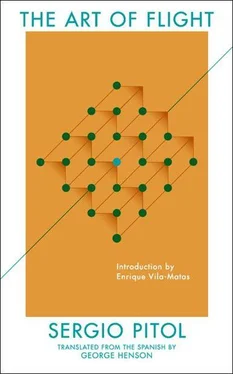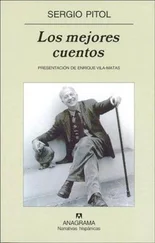Sergio Pitol - The Art of Flight
Здесь есть возможность читать онлайн «Sergio Pitol - The Art of Flight» весь текст электронной книги совершенно бесплатно (целиком полную версию без сокращений). В некоторых случаях можно слушать аудио, скачать через торрент в формате fb2 и присутствует краткое содержание. Год выпуска: 2015, Издательство: Deep Vellum, Жанр: Современная проза, на английском языке. Описание произведения, (предисловие) а так же отзывы посетителей доступны на портале библиотеки ЛибКат.
- Название:The Art of Flight
- Автор:
- Издательство:Deep Vellum
- Жанр:
- Год:2015
- ISBN:нет данных
- Рейтинг книги:5 / 5. Голосов: 1
-
Избранное:Добавить в избранное
- Отзывы:
-
Ваша оценка:
- 100
- 1
- 2
- 3
- 4
- 5
The Art of Flight: краткое содержание, описание и аннотация
Предлагаем к чтению аннотацию, описание, краткое содержание или предисловие (зависит от того, что написал сам автор книги «The Art of Flight»). Если вы не нашли необходимую информацию о книге — напишите в комментариях, мы постараемся отыскать её.
The first work in Pitol's "Trilogy of Memory," The Art of Flight imaginatively blends the genres of fiction and memoir in a Borgesian swirl of contemplation and mystery, expanding our understanding and appreciation of what literature can be and what it can do.
The Art of Flight — читать онлайн бесплатно полную книгу (весь текст) целиком
Ниже представлен текст книги, разбитый по страницам. Система сохранения места последней прочитанной страницы, позволяет с удобством читать онлайн бесплатно книгу «The Art of Flight», без необходимости каждый раз заново искать на чём Вы остановились. Поставьте закладку, и сможете в любой момент перейти на страницу, на которой закончили чтение.
Интервал:
Закладка:
The afternoon dragged on, like a nightmare. But, to his surprise, no one discovered the crime. No one came by the house or called to congratulate him. The apathy toward literature from those around him left him perplexed and disappointed. The remaining articles he submitted appeared the following Sundays. He had returned to Mexico City; his friends’ comments left him undaunted. He did not care whether anyone read them or not, whether anyone liked them or not, even if it wasn’t entirely true. In any case, he did not succumb to the vice of writing again for some time.
Over the years he has come to believe that he would have preferred to be discovered that Sunday when his guilt was made public. Not only that, but also to be mocked and condemned; everything would have been easier, cleaner. His relationship with the world could have been cleared of many cobwebs. Now, more than forty years after that incident, he’s content with merely acknowledging the event. He tries to examine the circumstances, to elaborate a few hypotheses. Why was that rite of initiation bathed in horror? Did it have something to do with a late detachment of his umbilical cord, a bloody separation of his body from those around him? He arrives at the conclusion that the exercise is becoming a pointless guessing game, that to continue it would send him into a labyrinth of astonishment. He would become lost in marshes without ever touching solid ground.
Perhaps he owes to that experience his inability to write at home, as if it were an activity to be avoided at all costs. Writing in the same space where he lives was for much of his life equivalent to committing an obscene act in a holy place. But that’s anecdotal. What is certain is that his fall into uncleanness that characterized, at the end of his adolescence, his confrontation with the word, his printed word, has conditioned his most personal, most secret, most unwitting manner of writing, and has transformed the exercise into a joyful game of concealment, an approach to the art of flight.
Xalapa, December 1994
DIARY FROM ESCUDILLERS 3
(At the end of 1968, I left the Mexican embassy in Belgrade, where I was carrying out my first diplomatic mission. I refused to continue to collaborate with the Mexican government after Tlatelolco. I returned to Mexico and found the atmosphere to be unbreathable. A female friend promised to help me find a job in London as a translator at The Economist , which was about to begin publishing in Spanish. It was almost certain that I would begin working in October. I would be able to spend the summer in Poland as a guest of Zofia Szleyen. My attendance at a conference on Conrad, I thought, would allow me to obtain a visa. I stopped in Barcelona to deliver the translation of Cosmos , by Gombrowicz, to Seix Barral, which I had almost finished, thinking it would only be a matter of a couple more weeks’ work. I arrived in Barcelona on June 20, 1969, at midnight, at the Francia station. I did not know the city. I asked the taxi driver to recommend a pleasant and moderately priced hotel. He took me to a place out of this world, which ended up being a hostel on Calle de Escudillers. I was planning to wait there for some money that was being sent from Mexico to continue my trip, as well as the invitation to the conference in Warsaw, or the personal invitation from my friend Zofia, without either of which I would not be able to obtain a Polish visa. Instead of the three weeks I intended to spend in Barcelona, I stayed three years. The memory of those times, of wonderful friends, of constant surprises still moves me today. My time there, in spite of the initial snags and a few spectacular surprises that at the moment seemed like the impending Last Judgment, only to end up disappearing into the air, constituted a daily exercise of freedom.)
BARCELONA, 22 JUNE 1969
One A.M. It’s raining. My tiny room traps all the noise from the neighborhood. A very acute depression this afternoon…tremors. I’ll never drink again. It must be the hangover from a monstrous cognac drunk, or some horrid liquor they passed off as cognac. After I settled into the room I went out and toured all the city’s bars near the hostel. Limitless excitement about the city’s nightlife. I walked without stopping along La Rambla and Escudillers, driven by curiosity or rather by the necessity to become acquainted with what will be my neighborhood for the next few days. I still haven’t been able to tackle Cosmos . I wrote two letters. One to Neus, another to Díez-Canedo, giving them my address for the checks I’m expecting. The trip to Spain was very exciting. As the train approached the border, I heard songs of the Fifth Regiment, which some teenagers were singing in the compartment next to mine. To interrupt the climax I made small talk with a plump, toothless French girl seated across from me. Collioure, Perpignan, Argelès, names I heard spoken so many times by Don Manuel Pedroso, by Max Aub, Garzón del Camino, Ara and María Zambrano: a crescendo of excitement. By the time I arrived at the border, I would forever hate the French girl, who was missing two front teeth, because of the contempt she expressed for the Spaniards and their songs. “To us they’re primitive, they think they’re going to save the world with their songs, no matter what they do, they’ll always be primitive,” smiling as she said it, her lips creased like the Mona Lisa, hiding her oral cavity.
Yes, my neighborhood is bustling, which is fine, although it seems like they go overboard just a bit. Something tells me this isn’t my city. I find it excessively noisy, deafening, and insane in its hyperactivity. The guardia civil stopped two hippies this afternoon beside my hotel and beat them mercilessly. A group of them walk along La Rambla frequently; a mix of intelligent and delicate faces with others that are excessively barbarian: young people of both sexes decked out in Afghani, Indian, or Nepalese blouses and jackets, alongside others who barely cover their flesh in rags; Germans, English, French, Scandinavians; they barely speak to Spaniards. They hang out in the Dingo, a bar located beside the Plaza Real, which is also beside my hostel. My room, because of its modesty, takes me back to Vittoria, Rome, 1961. Apparently, I’m neither maturing nor making progress.
23 JUNE
No, I do not get this city. Yesterday afternoon I went to the movies. I did the same today. Double feature: one of the movies was the really ancient Ahí está el detalle , with Cantinflas. A way of escaping reality, it seems, of blotting out the racket where I live. I’m starting to feel a bit like a coward. I walk a lot, but I never leave La Rambla or Escudillers. My biggest entertainment: watching the expressions and habits of the exotic hippies, who also never leave the Plaza Real and its surroundings, and who usually hole up in the Dingo. Racket, scandal at all hours, enough to drive anyone crazy! I should have changed hotels the day after I arrived; instead I sent everyone this address, and now I have to grin and bear it until my correspondence gets here. You can get by here on a few pesetas a day.
7 JULY
Terrible insomnia. I fall asleep around seven or eight in the morning, which causes me to stay in bed until evening, and I wake up furious that I’ve wasted the day, which makes it impossible to have any kind of normal work schedule. I visited Pepe and María del Pilar Donoso. We talked at length about friends from Mexico, about Pepe’s illnesses, the novel he’s writing. The plot, which he explained in broad terms, is fascinating. I ask them about their life in Barcelona, and they respond vaguely, as if they wanted to avoid the subject. New friendships: a young married couple, both writers; he works at Seix Barral; she’s finishing university. The extreme seriousness they’ve established between themselves surprises me. Last night I finished my revisions of Cosmos , by Gombrowicz. I’m in a panic, at wit’s end. My money situation is getting dire. The trip to Warsaw appears uncertain. Not many letters from Mexico. Today I’m going back to Jean Franco’s book. The hippies are an enigma to me, an amazing phenomenon. The only thing I knew about them came from the press. I saw them in London a few months ago, but there the city absorbed them, despite openly shooting heroin in the metro and public toilets. In Barcelona they stand out from the rest of the city, its customs, Spain, even in this neighborhood that is the height of obscenity, but an obscenity of another kind, that has taken centuries to create. This mix of multiple nationalities, unlike anything else I’ve ever seen, is a novelty I still haven’t been able to digest. I exchanged a few words in the Dingo with a hippie with hellishly dirty, iodine-colored hair. They walk around in groups; in general they’re boring and sullen. This one seems more independent, more upbeat, and bordering on a sense of humor. I’m starting to get used to Barcelona; but to be completely comfortable I’d need a more obvious element of foreignness, like other European cities I’ve lived in. A greater distance from the language and customs could help me adjust to the paralysis I’m experiencing.
Читать дальшеИнтервал:
Закладка:
Похожие книги на «The Art of Flight»
Представляем Вашему вниманию похожие книги на «The Art of Flight» списком для выбора. Мы отобрали схожую по названию и смыслу литературу в надежде предоставить читателям больше вариантов отыскать новые, интересные, ещё непрочитанные произведения.
Обсуждение, отзывы о книге «The Art of Flight» и просто собственные мнения читателей. Оставьте ваши комментарии, напишите, что Вы думаете о произведении, его смысле или главных героях. Укажите что конкретно понравилось, а что нет, и почему Вы так считаете.












